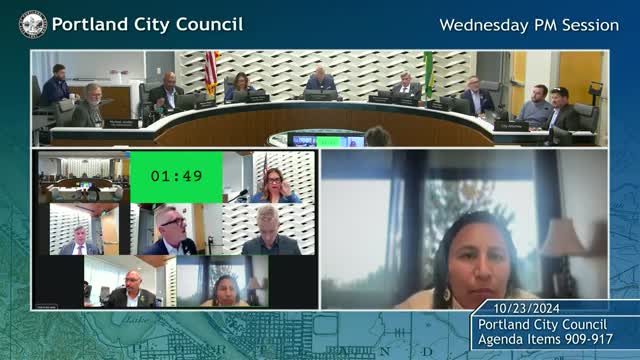Concerns rise over TIFs fueling gentrification in Portland
October 24, 2024 | Portland, Multnomah County, Oregon
This article was created by AI summarizing key points discussed. AI makes mistakes, so for full details and context, please refer to the video of the full meeting. Please report any errors so we can fix them. Report an error »

Concerns surrounding Tax Increment Financing (TIF) programs were raised during a recent government meeting, highlighting their potential role as corporate subsidies rather than effective tools for community development. Critics argue that TIFs often lack transparency, making it difficult to ascertain who truly benefits from these financial mechanisms in the long term.
A resident of Parkrose expressed apprehension that TIFs may disproportionately favor wealthy developers at the expense of local communities, potentially exacerbating existing inequities in Portland. The speaker emphasized that while TIFs are intended to boost neighborhood health and economies, they may inadvertently reinforce gentrification and fail to deliver equitable benefits to marginalized groups.
The discussion also pointed to the reliance on private developers, who are primarily motivated by quick returns on investment, rather than focusing on systemic urban inequities. This raises concerns about the long-term viability of TIF benefits for residents in neighborhoods undergoing development or gentrification.
Additionally, the speaker highlighted the risk that local schools, particularly the Parkrose School District, may not receive fair economic improvements from TIF initiatives, especially as the district navigates its own financial challenges. The call for greater transparency and accountability in TIF allocations was a central theme, with the hope that future evaluations will provide clearer insights into the impacts of these programs on local communities.
A resident of Parkrose expressed apprehension that TIFs may disproportionately favor wealthy developers at the expense of local communities, potentially exacerbating existing inequities in Portland. The speaker emphasized that while TIFs are intended to boost neighborhood health and economies, they may inadvertently reinforce gentrification and fail to deliver equitable benefits to marginalized groups.
The discussion also pointed to the reliance on private developers, who are primarily motivated by quick returns on investment, rather than focusing on systemic urban inequities. This raises concerns about the long-term viability of TIF benefits for residents in neighborhoods undergoing development or gentrification.
Additionally, the speaker highlighted the risk that local schools, particularly the Parkrose School District, may not receive fair economic improvements from TIF initiatives, especially as the district navigates its own financial challenges. The call for greater transparency and accountability in TIF allocations was a central theme, with the hope that future evaluations will provide clearer insights into the impacts of these programs on local communities.
Don't Miss a Word: See the Full Meeting!
Go beyond summaries. Unlock every video, transcript, and key insight with a Founder Membership.
✓
Get instant access to full meeting videos
✓
Search and clip any phrase from complete transcripts
✓
Receive AI-powered summaries & custom alerts
✓
Enjoy lifetime, unrestricted access to government data
30-day money-back guarantee

